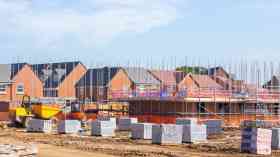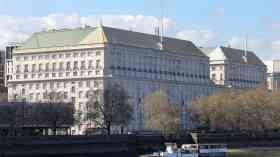Concrete Canvas Ltd is proud to be exhibiting at the International Security Expo for the first time, as we celebrate our 20th year in business.
Councils facing serious financial risks from pandemic
The Institute for Fiscal Studies has warned that councils in deprived and affluent areas face serious financial risks from the coronavirus crisis as incomes fall and costs grow, but nature and timing differ.
The government has provided an additional £3.2 billion of general-purpose funding to English councils to help support them through the coronavirus crisis, increasing their budgets by just over five per cent on average. However, councils have repeatedly warned that a further £6 billion could be required.
The latest report from the IFS examines how financial risks and resilience vary across councils, and which types of councils and regions are most exposed. It found that, in the short term, councils’ locally generated incomes are likely to be more affected than their spending. Income from local taxes – council tax and business rates – and especially sales, fees and charges and commercial activities will all be hit by the economic effects of lockdown and social distancing. Shire district councils are especially vulnerable to income losses.
Councils in more affluent areas tend to be more dependent on these income streams and could therefore be hit hardest. However, the IFS claims that there are big differences between even neighbouring councils, which will make it hard for central government to target help. For example, in Tandridge in Surrey, income from sales, fees and charges from the aforementioned services equate to less than seven per cent of non-schools expenditure, compared with 88 per cent in neighbouring Reigate and Banstead.
Meanwhile, councils serving more deprived communities are more likely to see increases in demand for their services over the next few years if those individuals and families who are already disadvantaged are hit harder by the health and social impacts of the crisis. Rates of mental ill health are over 1.5 times higher in the most deprived tenth than the least deprived tenth, and around twice as high in places such as Manchester (22 per cent) and Hackney (24 per cent) than in Wokingham (12 per cent), the least deprived council in England.
Approximately one-in-eight councils had reserves forecast to be less than 20 per cent of their annual non-schools expenditure before the coronavirus crisis hit, making them less able to manage a decline in revenues.
Kate Ogden, a research economist at IFS and an author of the report, said: "The fact that councils are facing unprecedented spending pressures and declines in income is not surprising. But given that Covid-19 itself is hitting more deprived communities and families the hardest, what may be surprising is that it is councils serving more affluent areas that are likely to see the biggest short-term financial hit. This is because they rely more on revenue streams – such as local taxes and sales, fees and charges – that are likely to be hit especially hard by lockdown and the wider economic effects of the crisis. Where councils serving more deprived areas look more at risk is the vulnerability of their residents to the impacts of the crisis on health and well-being given high pre-existing prevalence of mental ill health, housing difficulties, interactions with children’s services and child poverty. This is likely to push up their spending needs in to the longer term."
Richard Watts, chair of the Local Government Association’s Resources Board, said: “Councils across the country are leading efforts to support communities through the unprecedented coronavirus crisis we face. They continue to do an amazing job. Emergency government funding provided to councils has helped them in dealing with the impact of Covid-19 in recent months. Further funding and financial flexibilities are now needed to help councils meet a shortfall which we estimate could reach at least a further £6 billion this year.
“We are pleased that the government has indicated it is working on a comprehensive plan to address the ongoing financial challenges councils face this financial year as they lead communities through the pandemic. We urge the government to bring forward details of this plan as soon as possible. This is vital if councils are to avoid taking measures, such as in-year cuts to local services, to cope with funding shortfalls and meet the legal duty to balance their budgets.”
Steve Reed, Labour’s Shadow Communities and Local Government Secretary, responded: “The funding that councils have received is nowhere near enough to cover the cost of getting communities through this crisis. Now councils face a massive financial black hole that will hit poorer areas hardest.
“By law councils will be forced to make devastating in-year cuts that will see frail older people denied care, libraries and leisure centres shut for good and bins left unemptied. The Conservatives have broken their promise to fund councils to do whatever’s necessary. Instead of levelling up they are leaving communities without the funding they need to get through the pandemic at their time of greatest need. They should stand by their promises.”
Company Focus
Event Diary
Join us for the landmark 10th Anniversary of the London Build Expo, the UK’s largest and most influential construction and design show.
Retail Supply Chain & Logistics Expo returns to Excel London across 12-13 November, once again bringing together the world of logistics, supply chain, eCommerce and retail innovation for two dynamic days of opportunity.
Every sport, from grassroots football to world-class tournaments, depends on one constant: high-quality playing surfaces and well-maintained green spaces.
Supplier Profiles
Bauder Accepts Keys to its New UK Distribution Centre at Gateway 14
Bauder marked a major milestone in its UK expansion with the official handover of a brand
Words of World: Bridging language barriers with excellence
At Words of World, we specialise in professional translation and interpreting, d
Latest Features
The British Institute of Cleaning Science (BICSc) and the Cleaning & Support Services Association (CSSA) have successfully completed a groundbreaking project aimed at exploring the future of cleaning. This collaboration marks a significant milestone in the cleaning industry, reflecting a shared commitment to embracing innovation with confidence.
The Crown Commercial Service’s (CCS) new framework on Language Services (RM6302), dealing with translation, transcription and interpreting, is live, running from 7th May 2025 to 6th May 2028.














